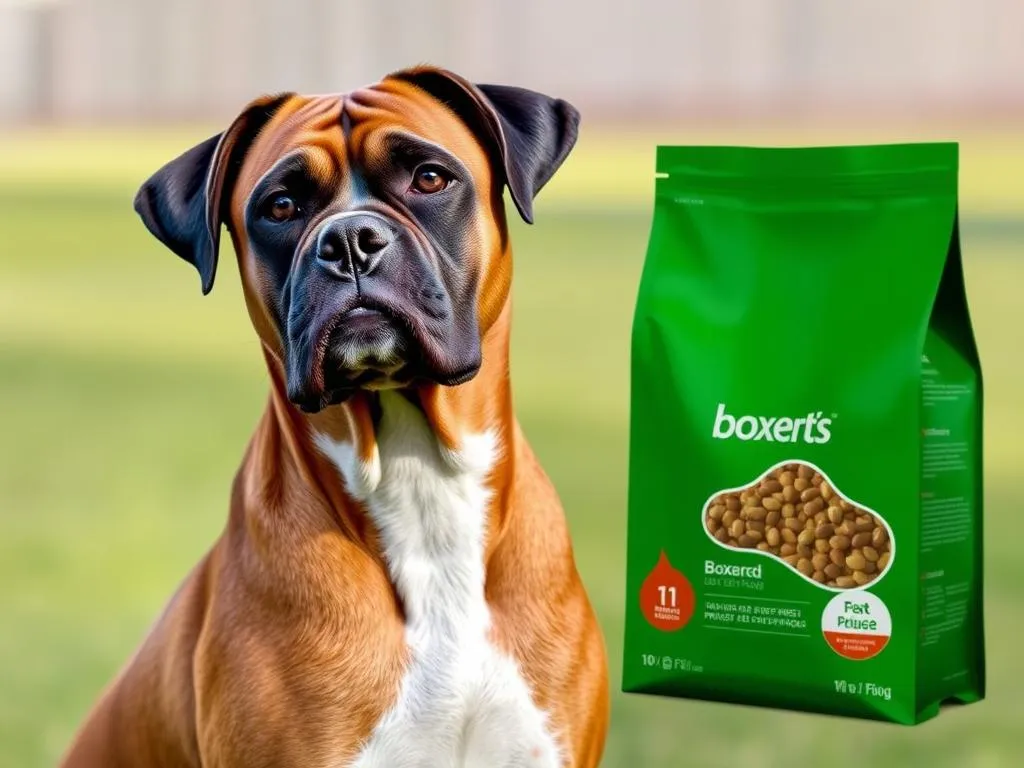
Introduction
Boxers are a beloved breed known for their athletic build, playful temperament, and loyalty. With their distinct square muzzle and strong, muscular bodies, Boxers are both striking and energetic. They are known to be intelligent, lively, and protective, making them excellent companions and family pets. However, their unique characteristics also come with specific nutritional needs that set them apart from other dog breeds.
Proper nutrition plays a pivotal role in ensuring the health and longevity of Boxers. With their high energy levels and predisposition to certain health issues, the right diet can significantly impact their overall well-being. A balanced diet not only promotes healthy growth and development but also helps prevent common health problems that Boxers may face, such as heart disease, allergies, and obesity. Understanding these nutritional needs is essential for every Boxer owner.
Understanding the Nutritional Needs of Boxers
Key Nutritional Components
Proteins
High-quality protein is crucial for Boxers, particularly for muscle development and maintenance. Boxers are active dogs that require protein to support their energy levels and muscular structure. Look for dog foods that list meat as the first ingredient, ensuring your Boxer gets the necessary amino acids for optimal health.
Fats
Healthy fats are another vital component of a Boxer’s diet. They provide energy, support skin and coat health, and aid in nutrient absorption. Omega-3 and Omega-6 fatty acids are particularly beneficial for Boxers, promoting a shiny coat and healthy skin.
Carbohydrates
While dogs are primarily carnivorous, carbohydrates play an essential role in providing energy and aiding digestion. Whole grains and vegetables can be excellent sources of fiber, supporting digestive health. However, it’s crucial to choose high-quality sources without excessive fillers.
Vitamins and Minerals
A well-rounded diet for Boxers should include essential vitamins and minerals that bolster their immune system and overall health. Nutrients such as calcium, phosphorus, and vitamins A, D, and E are important for bone health, vision, and skin health.
Specific Dietary Considerations
Age-Specific Needs
Boxers have different nutritional needs at various life stages. Puppies require a diet rich in protein and fat to support their rapid growth and energy levels. Adult Boxers need a balanced diet to maintain their weight and energy, while senior Boxers might benefit from lower-calorie options to prevent obesity and support joint health.
Health Conditions
Boxers are prone to specific health issues, including heart problems and allergies. A diet tailored to address these concerns can make a significant difference. For instance, a heart-healthy diet rich in Omega-3 fatty acids and low in sodium can support cardiovascular health, while hypoallergenic diets can help manage food sensitivities.
Factors to Consider When Choosing Dog Food for Boxers
Ingredients to Look For
Whole Foods vs. By-Products
Choosing dog food made from whole food ingredients is essential for providing your Boxer with quality nutrition. Whole meats, vegetables, and grains offer the best balance of nutrients. Avoid foods that contain meat by-products, as they may not provide the same quality of protein and can be less digestible.
Avoiding Fillers and Artificial Additives
Low-quality fillers like corn, soy, and artificial additives can detract from the nutritional value of dog food. These ingredients often provide little to no nutritional benefit and can lead to health issues over time. Look for dog foods free from artificial colors, flavors, and preservatives.
Types of Dog Food
Dry Kibble
Dry kibble is a popular choice among dog owners because it is convenient and can help maintain dental health. Look for premium brands that focus on high-quality ingredients tailored for Boxers. However, some Boxers may require additional hydration, so be sure to monitor their water intake.
Wet Food
Canned or wet food options can be beneficial for Boxers, especially those who are picky eaters or have dental issues. Wet food often contains higher moisture content, which can aid in hydration. It can also be mixed with dry kibble to enhance flavor and nutrition.
Raw Diet
Raw feeding is an increasingly popular option among dog owners. Advocates argue that a raw diet mimics what dogs would eat in the wild, providing a natural balance of proteins, fats, and enzymes. However, raw diets can pose risks, such as bacterial contamination, and should be approached with caution. Consultation with a veterinarian is recommended before transitioning to a raw diet.
Homemade Diets
Preparing homemade meals for Boxers can be rewarding, but it requires careful planning to ensure nutritional balance. Homemade diets should include a variety of proteins, carbohydrates, and vegetables, but it’s essential to consult with a veterinarian or a pet nutritionist to ensure that all dietary needs are met.
Top Recommended Dog Foods for Boxers
Brand Comparisons
High-Quality Dry Dog Foods
When searching for the best dog foods for Boxers, consider the following high-quality dry dog food brands:
- Orijen Original: Made from fresh, regional ingredients, this grain-free kibble is high in protein and rich in nutrients.
- Blue Buffalo Life Protection Formula: This formula features real meat as the first ingredient and includes whole grains, fruits, and vegetables.
- Wellness CORE Grain-Free: Packed with protein and free from fillers, this option supports energy levels and overall health.
Best Canned Dog Foods
For wet food, consider these top choices:
- Hill’s Science Diet Adult: This canned food is specially formulated for adult dogs, providing balanced nutrition and appealing flavors.
- Merrick Grain-Free Wet Dog Food: Made with real meat and wholesome ingredients, Merrick provides a hearty meal option for Boxers.
- Purina Pro Plan Savor Adult: This canned option features real meat and provides essential nutrients for an active lifestyle.
Specific Product Recommendations
Top 5 Best Dog Foods for Boxers
- Orijen Original Dry Dog Food
- Ingredients: Fresh chicken, turkey, and whole fish.
-
Benefits: High protein content supports muscle development; grain-free for easy digestion.
-
Blue Buffalo Life Protection Formula
- Ingredients: Deboned chicken, brown rice, and wholesome fruits.
-
Benefits: Antioxidants for immune support; formulated for a healthy lifestyle.
-
Wellness CORE Grain-Free
- Ingredients: Turkey, chicken, and potatoes.
-
Benefits: High protein without fillers; supports energy and lean body mass.
-
Hill’s Science Diet Adult Canned Dog Food
- Ingredients: Chicken, barley, and carrots.
-
Benefits: Balanced nutrition for adult dogs; gentle on the stomach.
-
Merrick Grain-Free Wet Dog Food
- Ingredients: Real beef and vegetables.
- Benefits: Rich in protein and moisture; promotes hydration and taste.
Grain-Free vs. Grain-Inclusive Options
The debate between grain-free and grain-inclusive diets continues among dog owners. While grain-free diets can be beneficial for dogs with specific sensitivities, they are not universally better for all dogs. Boxers can thrive on both types of diets, but it’s essential to monitor for any adverse reactions and adjust accordingly.
Feeding Guidelines for Boxers
Portion Sizes
Understanding serving sizes is crucial for maintaining a healthy weight in Boxers. Overfeeding can lead to obesity, which is particularly concerning for this breed due to their potential health issues. Generally, the recommended serving size will depend on the dog’s weight, age, and activity level. Always refer to the feeding guidelines on the dog food packaging, and adjust as needed.
Feeding Frequency
Feeding frequency varies between puppies, adults, and seniors.
- Puppies: They typically require three to four meals a day to support their growth.
- Adults: Most adult Boxers do well on two meals a day.
- Seniors: Older Boxers may benefit from smaller, more frequent meals to aid digestion.
Transitioning to New Dog Food
When switching your Boxer’s food, it’s crucial to do so gradually to avoid digestive issues. Start by mixing a small amount of the new food with the old food, gradually increasing the new food’s portion over a week. This slow transition helps your dog’s digestive system adapt to the new diet.
Common Myths About Dog Nutrition
Debunking Misconceptions
Grain-Free Diets Are Always Better
While grain-free diets can be suitable for dogs with certain allergies or sensitivities, they are not inherently better for all dogs. It’s essential to evaluate your Boxer’s individual needs and consult with a veterinarian before making dietary changes.
All Dog Foods Are the Same
Not all dog foods are created equal. Quality ingredients matter significantly when it comes to nutrition. Boxers require a diet tailored to their specific needs, and not every dog food will meet these standards.
Conclusion
Understanding the best dog foods for Boxers involves recognizing their unique nutritional needs and selecting high-quality ingredients that support their health and vitality. By focusing on protein-rich diets, healthy fats, and essential vitamins and minerals, Boxer owners can ensure their furry friends thrive.
As responsible pet owners, it’s crucial to stay informed about the dietary needs of Boxers. Prioritizing nutrition is key to preventing health issues and ensuring a happy, active life for your dog. Always consider consulting with a veterinarian for personalized dietary advice tailored to your Boxer’s specific health requirements.









